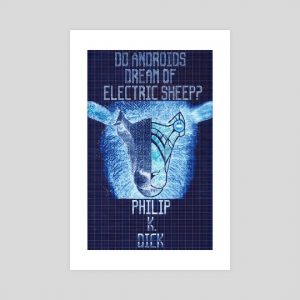Solidarity is the Only Way to Survive:
Struggle of Life in Philip K. Dick’s Do Androids Dream of Electric Sheep (1968)
by Selis Yıldız Şen

Do Androids Dream of Electric Sheep by Philip K. Dick is perhaps one of the most significant works of science fiction literature when it comes to introducing the concept and the experience of the cyborg. The core aspect of the novel revolves around the distinction between the cyborgs and humans, and the immediate relation that is born out of the representation of this differentiation, i.e., the lack of equality between those who are considered human and non-human, and also those who are considered not-properly-human, namely, the “specials.”
Three general groups of beings generate certain problems in relation to sharing a common atmosphere in Do Androids Dream of Electric Sheep. It could be said that all three groups of beings have certain representatives who constitute the cast of characters in the novel and all have an existence that seems to be irrelevant or incompatible towards one another. Whereas all of these beings, human, non-human and not-properly-human, i.e., “special”, have a relational organization of existence. In other words, even though these three groups of beings within the structure of regulations, from a general and initial perspective, depicted as incongruous and in perfect opposition. Ironically and paradoxically, these distinct groups of beings generate each other in a very subtle sense of unconcious solidarity. The solidarity within these presented groups, on the other hand, is quite obvious and it is clearly delineated. The solidarity between humans, for instance, is depicted through a synthetic medium that is manifested in a synaesthetically collective experience upon the usage of a tool called “empathy box.” This box is what affirms and assures a collective sharing of emotions which is, in many ways, the affirmation and assurance of the solidarity between humans. The solidarity between the cyborgs, i.e., non-humans, is rooted in their presence as a minority in opposition with the majority of human system and regulations. This experience of being a member of this minority is what connects these beings to each other. What makes android-solidarity such a significant depiction is possibly that they do not seem to need an “empathy box” in order to feel an attachment and conduct an existence of solidarity between each other, unlike humans. When it comes to the consideration of “specials” in relation to this particular point in question, the only representative the novel offers for the “special” population is a single character, John Isidore. This “special” man is presented as someone who takes part in both the communal dynamics of the androids and the society of humanity as well.
In the end, by creating a distinction between the human and non-human through focusing on both the experience of the human, the experience of the cyborg and also of a character who stands in the midst of these two sides, almost as a mediator, Philip K. Dick’s Do Androids Dream of Electric Sheep offers a tableau of a world where solidarity is the only way to survive in an environment and system which regulates its subjects in the utmost lack of equality.

